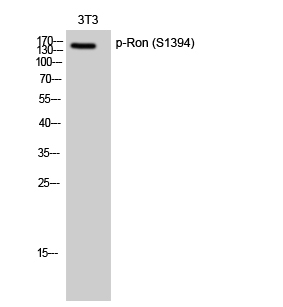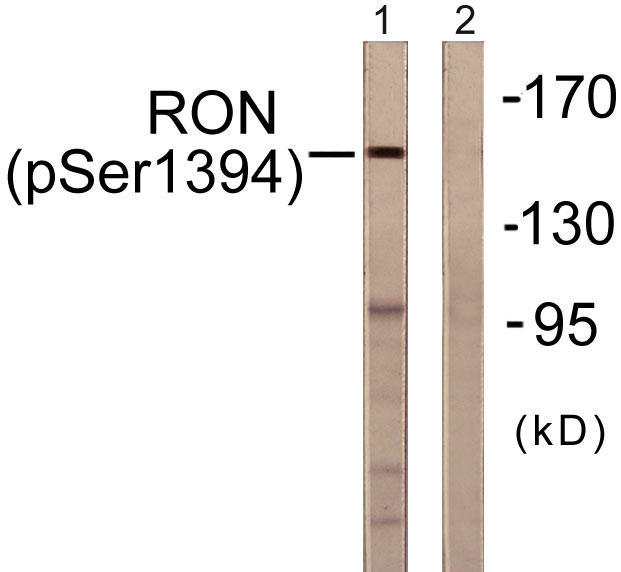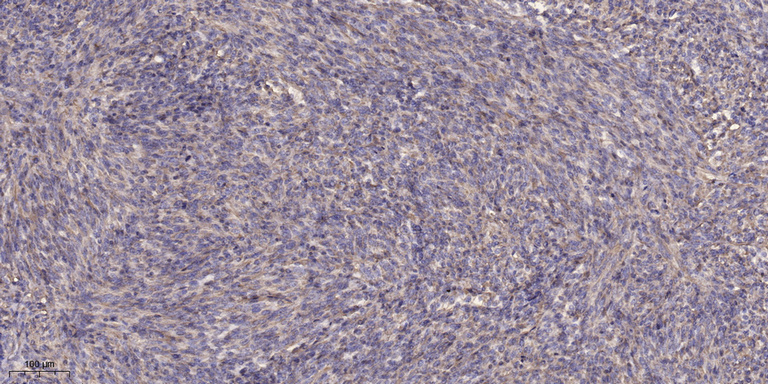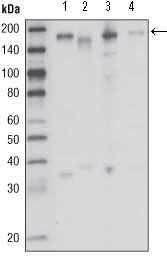Ron (phospho Ser1394) Polyclonal Antibody
- Catalog No.:YP0346
- Applications:WB;IHC
- Reactivity:Human;Mouse
- Target:
- Ron
- Fields:
- >>Calcium signaling pathway
- Gene Name:
- MST1R
- Protein Name:
- Macrophage-stimulating protein receptor
- Human Gene Id:
- 4486
- Human Swiss Prot No:
- Q04912
- Mouse Gene Id:
- 19882
- Mouse Swiss Prot No:
- Q62190
- Immunogen:
- The antiserum was produced against synthesized peptide derived from human CD136/RON around the phosphorylation site of Ser1394. AA range:1351-1400
- Specificity:
- Phospho-Ron (S1394) Polyclonal Antibody detects endogenous levels of Ron protein only when phosphorylated at S1394.
- Formulation:
- Liquid in PBS containing 50% glycerol, 0.5% BSA and 0.02% sodium azide.
- Source:
- Polyclonal, Rabbit,IgG
- Dilution:
- WB 1:500-2000;IHC 1:50-300
- Purification:
- The antibody was affinity-purified from rabbit antiserum by affinity-chromatography using epitope-specific immunogen.
- Concentration:
- 1 mg/ml
- Storage Stability:
- -15°C to -25°C/1 year(Do not lower than -25°C)
- Other Name:
- MST1R;PTK8;RON;Macrophage-stimulating protein receptor;MSP receptor;CDw136;Protein-tyrosine kinase 8;p185-Ron;CD antigen CD136
- Observed Band(KD):
- 152kD
- Background:
- This gene encodes a cell surface receptor for macrophage-stimulating protein (MSP) with tyrosine kinase activity. The mature form of this protein is a heterodimer of disulfide-linked alpha and beta subunits, generated by proteolytic cleavage of a single-chain precursor. The beta subunit undergoes tyrosine phosphorylation upon stimulation by MSP. This protein is expressed on the ciliated epithelia of the mucociliary transport apparatus of the lung, and together with MSP, thought to be involved in host defense. Alternative splicing generates multiple transcript variants encoding different isoforms that may undergo similar proteolytic processing. [provided by RefSeq, Jan 2016],
- Function:
- catalytic activity:ATP + a [protein]-L-tyrosine = ADP + a [protein]-L-tyrosine phosphate.,function:Receptor for macrophage stimulating protein (MSP). Has a tyrosine-protein kinase activity.,PTM:Phosphorylated in response to ligand binding.,PTM:Proteolytic processing yields the two subunits.,similarity:Belongs to the protein kinase superfamily. Tyr protein kinase family.,similarity:Contains 1 protein kinase domain.,similarity:Contains 1 Sema domain.,similarity:Contains 3 IPT/TIG domains.,subunit:Heterodimer formed of an alpha chain and a beta chain which are disulfide linked. Binds PLXNB1. Associates with and is negatively regulated by HYAL2.,tissue specificity:Keratinocytes and lung.,
- Subcellular Location:
- Membrane; Single-pass type I membrane protein.
- Expression:
- Expressed in colon, skin, lung and bone marrow.
- June 19-2018
- WESTERN IMMUNOBLOTTING PROTOCOL
- June 19-2018
- IMMUNOHISTOCHEMISTRY-PARAFFIN PROTOCOL
- June 19-2018
- IMMUNOFLUORESCENCE PROTOCOL
- September 08-2020
- FLOW-CYTOMEYRT-PROTOCOL
- May 20-2022
- Cell-Based ELISA│解您多样本WB检测之困扰
- July 13-2018
- CELL-BASED-ELISA-PROTOCOL-FOR-ACETYL-PROTEIN
- July 13-2018
- CELL-BASED-ELISA-PROTOCOL-FOR-PHOSPHO-PROTEIN
- July 13-2018
- Antibody-FAQs
- Products Images

- Western Blot analysis of 3T3 cells using Phospho-Ron (S1394) Polyclonal Antibody diluted at 1:500

- Enzyme-Linked Immunosorbent Assay (Phospho-ELISA) for Immunogen Phosphopeptide (Phospho-left) and Non-Phosphopeptide (Phospho-right), using CD136/RON (Phospho-Ser1394) Antibody

- Western blot analysis of lysates from HeLa cells treated with TNF-a 20ng/ml 2', using CD136/RON (Phospho-Ser1394) Antibody. The lane on the right is blocked with the phospho peptide.

- Immunohistochemical analysis of paraffin-embedded human Colon cancer. 1, Antibody was diluted at 1:200(4° overnight). 2, Tris-EDTA,pH9.0 was used for antigen retrieval. 3,Secondary antibody was diluted at 1:200(room temperature, 45min).



